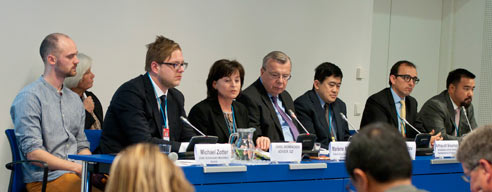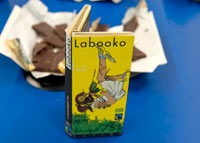
11 March 2015 - Chocolate and coffee are not ordinarily official topics of discussion at UN meetings, but this week at the 58th Commission on Narcotic Drugs, the role of alternative development and its commercial and social impacts was covered at an event held on the side-lines of the CND.
'Reassessing Alternative Development in the UNGASS 2016 process' - in reference to next year's UN General Assembly special session on drugs - brought together a diverse panel from across Governments, UNODC, community organizations and the private sector. Thai, German and Colombian officials spoke on the positive impact of alternative development, while Mae Fah Luang, a foundation that supports fair trade producers in Thailand, and Austrian chocolate producer Zotter, which sources its products exclusively with fair trade cocoa, discussed their work with farmers who have switched over to licit crops.
Alternative development is an important pillar of UNODC's work in assisting Member States in developing drug control policies which prevent and reduce the cultivation of illicit drug crops, such as coca bush and opium poppy. Without viable alternatives, farmers in isolated or poor communities grow these illicit crops due to insufficient income from legal activities, a lack of access to markets, conflict, unproductive land and an absence of basic infrastructure. Alternative development projects aim to provide sustainable livelihoods to those communities, and also target those that engaged in illicit cultivation in the past or are vulnerable to starting illicit cultivation in the future.
Speaking on this at the event, UNODC Executive Director Yury Fedotov said that alternative development is essential to achieving sustainable reductions in illicit drug crop cultivation: "We need to look at how we can further improve implementation, monitoring and financing for such initiatives."
Building partnerships between Governments and the private sector, where UNODC facilitates the sale of alternative development products on national and international markets, is a key component for the Office. For example, under the Alternative Development National Programme of Colombia, supported by UNODC, over 156,000 families have been involved.
 One instance of the success seen within this area is with Austrian chocolate maker
Zotter Schokoladen Manufaktur which works with cooperative producers such as the ones under UNODC's alternative development programme in Colombia and Peru. Attending the event, Michael Zotter said that his family's company works with some 234 families from the Chocó region of Colombia as part of their sourcing of high-quality cocoa and carry out similar business with farmer cooperatives in Tingo Maria, Peru. He noted the importance that the company places on long-term, sustainable support for the farmers, adding that the partnership had resulted in producers becoming more competitive and consistent, improving the quality of the cocoa beans, and obtaining the strict fair trade certifications needed to export goods. "We make an enormous productive and logistical effort. By doing this together, the farmers become more efficient and empowered. Our source producers need to be competitive", Mr. Zotter added.
One instance of the success seen within this area is with Austrian chocolate maker
Zotter Schokoladen Manufaktur which works with cooperative producers such as the ones under UNODC's alternative development programme in Colombia and Peru. Attending the event, Michael Zotter said that his family's company works with some 234 families from the Chocó region of Colombia as part of their sourcing of high-quality cocoa and carry out similar business with farmer cooperatives in Tingo Maria, Peru. He noted the importance that the company places on long-term, sustainable support for the farmers, adding that the partnership had resulted in producers becoming more competitive and consistent, improving the quality of the cocoa beans, and obtaining the strict fair trade certifications needed to export goods. "We make an enormous productive and logistical effort. By doing this together, the farmers become more efficient and empowered. Our source producers need to be competitive", Mr. Zotter added.
UNODC has facilitated a number of public-private partnerships across a range of products, which ultimately generate added-value and income for farmers. UNODC Deputy Executive Director, Aldo Lalo-Demoz, discussed the benefit of this: "Not only do these projects enable farmers to move away from illicit crops and into commercially viable licit activities, but they ultimately help build healthier, safer and more prosperous rural communities," he said. "In Peru, we helped thousands of farmers become shareholders of thriving and sustainable agribusinesses. Regarding the Colombian cocoa growers which Zotter sources from, they saw their monthly family income grow from $300 to $ 900 a month."
Alternative development is a fundamental pillar of a comprehensive international drug control strategy and continues to be the principal method utilized by Members States and UNODC to address illicit drug crop cultivation.
2016 Special Session of the UN General Assembly on the World Drug Problem